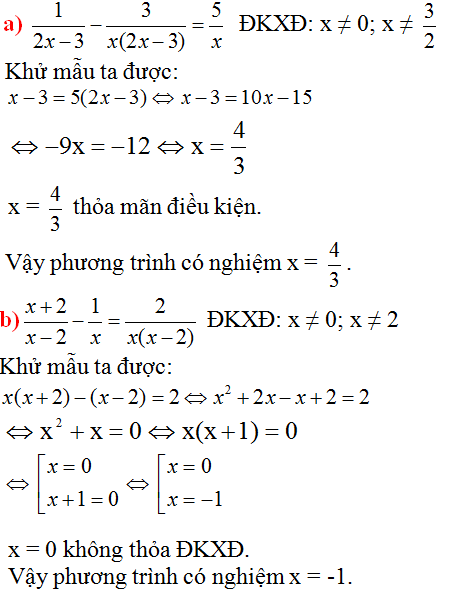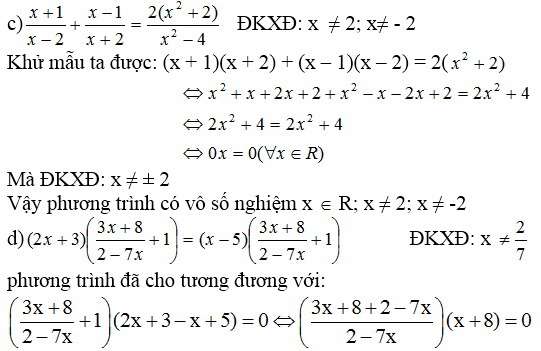Hãy nhập câu hỏi của bạn vào đây, nếu là tài khoản VIP, bạn sẽ được ưu tiên trả lời.

b)
ĐKXĐ: \(x\notin\left\{2;3;\dfrac{1}{2}\right\}\)
Ta có: \(\dfrac{x+4}{2x^2-5x+2}+\dfrac{x+1}{2x^2-7x+3}=\dfrac{2x+5}{2x^2-7x+3}\)
\(\Leftrightarrow\dfrac{x+4}{\left(x-2\right)\left(2x-1\right)}+\dfrac{x+1}{\left(x-3\right)\left(2x-1\right)}=\dfrac{2x+5}{\left(2x-1\right)\left(x-3\right)}\)
\(\Leftrightarrow\dfrac{\left(x+4\right)\left(x-3\right)}{\left(x-2\right)\left(2x-1\right)\left(x-3\right)}+\dfrac{\left(x+1\right)\left(x-2\right)}{\left(x-2\right)\left(x-3\right)\left(2x-1\right)}=\dfrac{\left(2x+5\right)\left(x-2\right)}{\left(2x-1\right)\left(x-3\right)\left(x-2\right)}\)
Suy ra: \(x^2-3x+4x-12+x^2-2x+x-2=2x^2-4x+5x-10\)
\(\Leftrightarrow2x^2-14=2x^2+x-10\)
\(\Leftrightarrow2x^2-14-2x^2-x+10=0\)
\(\Leftrightarrow-x-4=0\)
\(\Leftrightarrow-x=4\)
hay x=-4(nhận)
Vậy: S={-4}

f. 5 – (x – 6) = 4(3 – 2x)
<=>5-x+6=12-8x
<=>7x=1
<=>x=\(\dfrac{1}{7}\)
g. 7 – (2x + 4) = – (x + 4)
<=>7-2x-4=-x-4
<=>x=7
h. 2x(x+2)\(^2\)−8x\(^2\)=2(x−2)(x\(^2\)+2x+4)
<=>\(2x\left(x^2+4x+4\right)-8x^2=2\left(x^3-8\right)\)
<=>\(2x^3+8x^2+8x-8x^2=2\left(x^3-8\right)\)
<=>\(2x^3+8x=2x^3-16\)
<=>\(8x=-16\)
<=>\(x=-2\)
i. (x−2\(^3\))+(3x−1)(3x+1)=(x+1)\(^3\)
<=>\(x-8+9x^2-1=x^3+3x^2+3x+1\)
<=>\(6x^2-2x-10=0\)
<=>\(3x^2-x-5=0\)
<=>\(\left[{}\begin{matrix}x=\dfrac{1+\sqrt{61}}{6}\\x=\dfrac{1-\sqrt{61}}{6}\end{matrix}\right.\)
k. (x + 1)(2x – 3) = (2x – 1)(x + 5)
<=>\(2x^2-x-3=2x^2+9x-5\)
<=>10x=2
<=>\(x=\dfrac{1}{5}\)
f. 5 – (x – 6) = 4(3 – 2x)
<=>5-x+6=12-8x
<=>7x=1
<=>x=\(\dfrac{1}{7}\)
g. 7 – (2x + 4) = – (x + 4)
<=>7-2x-4=-x-4
<=>x=7
h. \(2x\left(x+2\right)^2-8x^2=2\left(x-2\right)\left(x^2+2x+4\right)\)
<=>\(2x\left(x^2+4x+4\right)-8x^2=2\left(x^3-8\right)\)
<=>\(2x^3+8x^2+8x-8x^2=2x^3-16\)
<=>\(8x=-16\)
<=>x=-2
i.\(\left(x-2\right)^3+\left(3x-1\right)\left(3x+1\right)=\left(x+1\right)^3\)
<=>\(x^3-6x^2+12x+8+9x^2-1=x^3+3x^2+3x+1\)
<=>\(9x+6=0\)
<=>x=\(\dfrac{-2}{3}\)
k. (x + 1)(2x – 3) = (2x – 1)(x + 5)
<=>\(2x^2-x-3=2x^2+9x-5\)
<=>10x=2
<=>x=\(\dfrac{1}{5}\)

\(i.\dfrac{\left(2x+1\right)^2}{5}-\dfrac{\left(x-1\right)^2}{3}=\dfrac{7x^2-14x-5}{15}\)
\(\Leftrightarrow\dfrac{4x^2+4x+1}{5}-\dfrac{x^2-2x+1}{3}=\dfrac{7x^2-14x-5}{15}\)
\(\Leftrightarrow\dfrac{12x^2+12x+3}{15}-\dfrac{5x^2-10x+5}{15}=\dfrac{7x^2-14x-5}{15}\)
\(\Leftrightarrow12x^2+12x+3-5x^2+10x-5=7x^2-14x-5\)
\(\Leftrightarrow36x=-3\)
\(\Leftrightarrow x=-\dfrac{1}{12}\)

ko ai giải đc à, giúp mk đi mà mau lên đang cần gấp, please
RẤT nhieu bn giai dc vi các pt này dễ nhung k ai giai vi nó dài ,làm mệt mà kè nhờ vả k biet ơn, k coi trọng chât xám
toàn là h tảo lao nên ng tài k dc trọng dụng , kẻ bât tai thi k giai dc, bởi z ng tài chỉ xem bài nào khó, k dài thi giai, dc kdc h cũng k cần

Bài `1:`
`h)(3/4x-1)(5/3x+2)=0`
`=>[(3/4x-1=0),(5/3x+2=0):}=>[(x=4/3),(x=-6/5):}`
______________
Bài `2:`
`b)3x-15=2x(x-5)`
`<=>3(x-5)-2x(x-5)=0`
`<=>(x-5)(3-2x)=0<=>[(x=5),(x=3/2):}`
`d)x(x+6)-7x-42=0`
`<=>x(x+6)-7(x+6)=0`
`<=>(x+6)(x-7)=0<=>[(x=-6),(x=7):}`
`f)x^3-2x^2-(x-2)=0`
`<=>x^2(x-2)-(x-2)=0`
`<=>(x-2)(x^2-1)=0<=>[(x=2),(x^2=1<=>x=+-2):}`
`h)(3x-1)(6x+1)=(x+7)(3x-1)`
`<=>18x^2+3x-6x-1=3x^2-x+21x-7`
`<=>15x^2-23x+6=0<=>15x^2-5x-18x+6=0`
`<=>(3x-1)(5x-1)=0<=>[(x=1/3),(x=1/5):}`
`j)(2x-5)^2-(x+2)^2=0`
`<=>(2x-5-x-2)(2x-5+x+2)=0`
`<=>(x-7)(3x-3)=0<=>[(x=7),(x=1):}`
`w)x^2-x-12=0`
`<=>x^2-4x+3x-12=0`
`<=>(x-4)(x+3)=0<=>[(x=4),(x=-3):}`
`m)(1-x)(5x+3)=(3x-7)(x-1)`
`<=>(1-x)(5x+3)+(1-x)(3x-7)=0`
`<=>(1-x)(5x+3+3x-7)=0`
`<=>(1-x)(8x-4)=0<=>[(x=1),(x=1/2):}`
`p)(2x-1)^2-4=0`
`<=>(2x-1-2)(2x-1+2)=0`
`<=>(2x-3)(2x+1)=0<=>[(x=3/2),(x=-1/2):}`
`r)(2x-1)^2=49`
`<=>(2x-1-7)(2x-1+7)=0`
`<=>(2x-8)(2x+6)=0<=>[(x=4),(x=-3):}`
`t)(5x-3)^2-(4x-7)^2=0`
`<=>(5x-3-4x+7)(5x-3+4x-7)=0`
`<=>(x+4)(9x-10)=0<=>[(x=-4),(x=10/9):}`
`u)x^2-10x+16=0`
`<=>x^2-8x-2x+16=0`
`<=>(x-2)(x-8)=0<=>[(x=2),(x=8):}`

a. 7(2x - 0,5) - 3(x + 4) = 4 - 5(x - 0,7)
⇔ 14x - 4,5 - 3x - 12 = 4 - 5x + 3,5
⇔ 14x -3x + 5x = 4 + 4,5 + 3,5
⇔ 16x = 12
⇔ x = \(\dfrac{12}{16}=\dfrac{3}{4}\)

a: \(\Leftrightarrow x^2-2x+1< x^2+3x\)
=>-5x<-1
hay x>1/5
b: \(\Leftrightarrow x^2-4x< x^2-4\)
=>-4x<-4
hay x>1
c: \(\Leftrightarrow2x+3< 6-3+4x\)
=>2x+3<4x+3
=>-2x<0
hay x>0
d: =>-2-7x>3+2x-5+6x
=>-7x-2>8x-2
=>-15x>0
hay x<0


\(x^4+2x^3+7x^2+26x+37=\left(x^4+2x^3+2x^2+2x+x^2+1\right)+\left(4x^2+24x+36\right)\)
\(=\left(x^2+x+1\right)^2+4\left(x+3\right)^2\)
Đặt: \(x^2+x+1=A;x+3=B\)
\(A\left(A^2+4.B^2\right)=5B^3\Leftrightarrow\left(A^3+5A.B^2\right)-\left(A.B^2+5B^3\right)=0\)
\(\Leftrightarrow\left(A-B^2\right)\left(A^2+5B^2\right)=0\). Em làm tiếp nhé!
Vẫn chưa hiểu phân tích của cô Chi)):
Ta có: \(x^4+2x^3+7x^2+26x+37=\left(x^4+2x^3+2x^2+x^2+2x+1\right)\)
\(+\left(4x^2+24x+36\right)=\left(x^2+x+1\right)^2+4\left(x+3\right)^2\)
Đặt \(x^2+x+1=u;x+3=v\)
Phương trình trở thành \(u\left(u^2+4v^2\right)=5v^3\)
\(\Leftrightarrow u^3+4uv^2=5v^3\)
\(\Leftrightarrow\left(u^3-v^3\right)+\left(4uv^2-4v^3\right)=0\)
\(\Leftrightarrow\left(u-v\right)\left(u^2+uv+v^2\right)+4v^2\left(u-v\right)=0\)
\(\Leftrightarrow\left(u-v\right)\left(u^2+uv+5v^2\right)=0\)
+) \(u-v=0\Rightarrow u=v\)
\(\Rightarrow x^2+x+1=x+3\Leftrightarrow x^2-2=0\Leftrightarrow x=\pm\sqrt{2}\)
+) \(u^2+uv+5v^2=0\)(vô nghiệm)
Vậy \(x=\pm\sqrt{2}\)